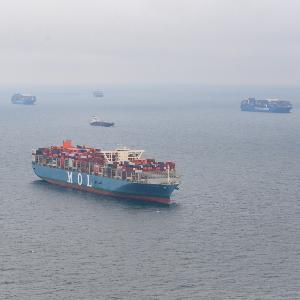New ways in globalization research
19 Oct 2022
The LMU “global dis:connect” research center investigates the complex and at times opposing phenomena of global integration. Now it is hosting its first annual conference.
19 Oct 2022
The LMU “global dis:connect” research center investigates the complex and at times opposing phenomena of global integration. Now it is hosting its first annual conference.

Straining supply chains: container ships waiting in the Deutsche Bucht | © Jonas Walzberg/Picture Alliance/dpa
Just 15 years ago, global consolidation and integration were considered unassailable and unstoppable. Globalization meant ever faster, ever denser, ever more international. Since then, cracks have appeared in this picture. The world that was supposedly coming together with all the force of inevitability is in turmoil. Anti-globalism and jingoistic nationalism are becoming increasingly influential political currents. From a material point of view, we are seeing a rise in countervailing trends: protectionism, isolationism, and straining supply chains are disruptive forces that are difficult to rein in. The global financial crisis of 2008, Brexit, the pandemic, and the war in Ukraine characterize this new world, for which talk of de-globalization has become ubiquitous.
About a year ago, a new research center at LMU began its work. At the Käte Hamburger Research Centre, which is funded by the German Federal Ministry of Education and Research, scholars are looking into this phenomenon from different perspectives. The goal of the research center is to rethink our understanding of globalization processes. Opposing and delaying moments of interruption, detour, and absence go hand in hand with globalization, and this realization is symbolized in the name global dis:connect. According to a founding principle of the research center, which brings together researchers from the fields of history, art history, and theater studies along with practicing artists, designers and architects, the humanities and the arts can offer particularly heuristic access to the effects of globalization processes – beyond fixed structures and “objective” data – by reflecting the fluidity and transience of “dis:connective” phenomena.
On October 20 and 21, the research center is hosting its first annual conference. The focus of the event will be on new theories, methods, and case studies that ground and sharpen the approach of dis:connectivity, which is that globalization processes were, and still are, characterized by a dynamic and co-constitutive relationship of connection and disconnection. The two-day annual conference has a hybrid event format. Further information on the conference, the program, and registration is available on the website of the Käte Hamburger Research Center. Speakers are Aleksandra Domanović (Berlin), Valeska Huber (Vienna), Richard M. Kabiito (Kampala), Gabriele Klein (Hamburg), Anupama Kundoo (Potsdam), Peter W. Marx (Cologne), Meha Priyadarshini (Edinburgh), Kerstin Schankweiler (Dresden), Promona Sengupta (Berlin), and Sujit Sivasundaram (Cambridge, Great Britain).
For further information please see the global dis:connect website.